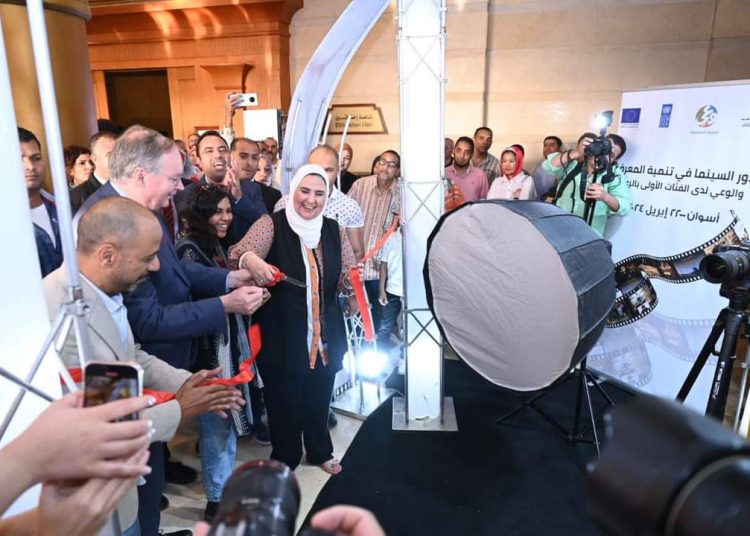Wael Salem
The eighth edition of Aswan International Women’s Film Festival (AIWFF) wrapped up on Thursday in Egypt’s southernmost city of Aswan, some 800km south of Cairo.
The festival screened 76 films from all over the world, focusing on women’s issues and rights. It featured documentaries from the Awareness for Community Development Programme and the Diarna exhibition, showcasing heritage products and crafts made by women.
Tunisia has been announced as the guest of honour of the AIWFF in recognition of the outstanding cinematic achievements of this country regarding works directed by women or tackling women-related issues.
Among the Tunisian films showing at AIWFF are Four Daughters (Les Filles d’Olfa), which has gained international acclaim and is competing in AIWFF Feature Film Category, written and directed by Kaouther Ben Hania and backstage by Atef Ben Mahmoud and Khalil Benkirane, which also competed in the Feature Film Category.
The festival hosted numerous filmmakers from Egypt and the international scene, who participated in workshops, seminars and talks.
Aswan International Women Film Festival was established in 2017 as the first Egyptian film festival that focuses on cinematic works representing women’s issues, celebrating their success stories and supporting female filmmakers in Egypt and the Middle East and North Africa (MENA) region.
The opening ceremony this year was attended by Aswan Governor Ashraf Attia, Culture Minister Nevine el-Kilany, Social Solidarity Minister Nevine el-Qabbag and Maya Morsy, President of the National Council for Women (NCW), as well as a host of filmmakers and critics.
This year’s edition paid tribute to illustrious actor and comedian Salah al-Saadani (1943-2024) who died two weeks ago.
El-Qabbag gave special greetings to everyone who contributes to supporting women’s issues.
“Cinema and drama are soft powers, discussing various issues concerning all members of society, especially women,” she said, adding that the AIWFF introduced films that penetrate the communal conscience regarding women’s issues.
“Art, she said, is a vehicle of change and not just a way of expression,” she said.
Upper Egypt’s women in general and Aswan women in specific form the pillars of the Upper Egyptian society, she said.
El-Qabbag spoke of Palestinian women, mourning the many of them who lost their lives to the war. She lauding the resilience of those who suffered the extreme hardship brought on by the war. She also lamented the abuse suffered by Sudanese women during the conflict and violence taking place in Sudan.
The Ministry of Social Solidarity is tasked with addressing a range of social issues including poverty, social inequality, the welfare of peasants, education, social reform, the citizen’s relationship with the State, the family, women’s issues, drug abuse, disease and crime.
In her speech, Culture Minister Nevine el-Kilany, said that the AIWFF has been able to leave a prominent impact by highlighting the role of women in the community, discussing their issues, and displaying their creativity.
Aswan Governor, Major General Attia, welcomed the festival guests, and lauded the festival’s success in making Aswan the ‘capital of cinema’. He thanked the NCW and the European Union for their support of women’s issues through the festival.
AIWFF director Hassan Abul-Ela spoke, taking pride in the growth achieved by the festival over its eight years.
“We started eight years ago with two competitions and 30 films; today we have 76 films competing in six categories. We held one workshop, but today we have the biggest training programme among those of all film festivals of youth and women.
Mervat al-Tallawi, head of the board of trustees of AIWFF, drew attention to the great impact of women’s films, saying that some of these films in Egypt led to changes in the law, making it fairer to women.
This year’s edition has special programmes for Sudanese and Palestinian films with a focus on women.
Palestinian film director Rashid Masharawi said it is important for the Arab world’s society to shed light on the issues and problems facing women through cinema and film festivals.
“The AIWFF is developing rapidly and the participation of movies, filmmakers and workers in the field is increasing notably every year, which means the festival is a real success,” Egyptian film director Hala Khalil told The Egyptian Gazette.
“The AIWFF is the first festival with a specialised programme of filmmaking workshops for the youth in the region, led by industry professionals, bringing the educational opportunities and skills needed to Aswan,” AIWFF director Abu-Ela told this paper.
The festival honoured Christian Berger, Head of the European Delegation to Egypt, for the EU’s support of the festival.
Also honoured as exemplary figures of Aswan festival women were Tunisian actress Hend Sabry for her distinguished cinematic roles, Tunisian film editor Kahena Attia, Mona al-Sabban, professor at the High Institute of Cinema and Ghada Abu-Zeid, Deputy Governor of Aswan.






Discussion about this post